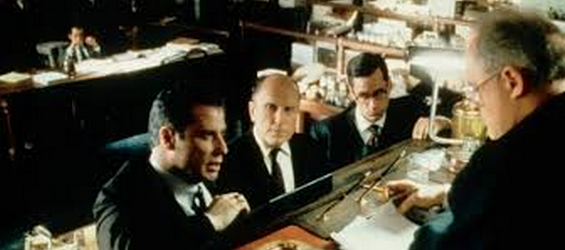The courtroom drama can be a pretty tired plot vehicle for many, perhaps justifiably so. It sometimes seems that the clichés are so well rehearsed that even the counter-clichés appear just as threadbare: people redeeming themselves through the law (e.g., see here and here) are about as compelling as people damning themselves because of it (e.g., see here and here). In this weekend’s film recommendation, Steven Zaillian’s A Civil Action, there’s no attempt to play around with or develop those clichés. Nonetheless, the true story from which this dramatization is lifted is more than enough to hold your attention.
John Travolta plays Jan Schlichtmann, a Boston-based personal injury lawyer. It doesn’t take long to develop an unflattering opinion of Schlichtmann: no sooner has he dismissed the charge of being a mere ‘ambulance chaser’ than he is distributing business cards to car crash victims as he passes by them on the street. There’s no question that Schlichtmann is in it for the money, as he’ll leap to consider the depths of his clients’ pockets—or those of his wretched opponents—far sooner than he will consider the probity of his legal arguments. He’s a money-grubbing lawyer of the scummiest kind.
Schlichtmann receives a phone call from the distressed mother of a recently deceased child. She entreats him to visit her and the parents of seven other recently deceased children—all taken by leukemia—in the nearby town of Woburn. Schlichtmann’s initial inclination is to decline because of the prospect of a paltry payout; it’s just not good business, as far as he’s concerned. But the suspicion of a huge payout from a big name corporation’s toxic dump upstream spurs him to take the case and pursue it feverishly.
After the initial premise is set, surprisingly little focus is then spent on the film’s original motivations, namely Schlichtmann’s efforts to uncover malfeasance and the thorny mismatch between his venality and his clients’ desire for no more than a formal apology.
Instead, the film’s pace and tone pivots to Schlichtmann’s sparring with the opposing counsel Jerry Facher, played by Robert Duvall. Duvall is as superb as expected, with an understated and unplaceably buffoonish villainy to his demeanor. Facher’s free time is spent lecturing at Harvard, where he delights in instructing his students on how to avoid the very traps in litigation that he has set for Schlichtmann. While Schlichtmann has flair and flourish, Facher has cunning and wile.
The conceit pitting these two lawyerly styles against one another doesn’t translate into the courtroom bombastics that might typically be expected from late-‘90s Hollywood. However, the juxtaposition of the two characters sets up a nicely developed theme, which recurs throughout the film, of the centrality of prestige and class in the law. It goes to show that it’s not so much the substance of the arguments, and in some instances it’s not even the skill of their delivery, that wins the day; sometimes, the gates remain closed simply because you’re just not cut from the right cloth to compete among the big boys (and boys is accurate—the supporting cast, though tremendous, is almost exclusively male). As Keith pointed out so well in his review of The Spy Who Came in from the Cold, even when at their most subtle these observations on class can be used to devastating effect: Facher has few scruples parading his old-money connections with the judge (a delightfully crabby John Lithgow) for all to see, just as Schlichtmann is evidently perturbed by his dull Cornell pedigree among the Harvard muckety-mucks.
Of course, all of this is merely a prelude to learning that the Woburn case isn’t really the film’s point at all. Rather, it’s Schlichtmann’s search for purpose and his journey toward redemption after his colossal abdication of moral sense at the film’s outset. That journey is troubled and arduous, and he has few compunctions with endangering the livelihoods of his partners in the process.
As mentioned, the supporting cast is a treat. It includes Sydney Pollack, Stephen Fry, William H. Macy, Kathleen Quinlan, Tony Shalhoub, Dan Hedaya, and James Gandolfini in a much more tender role than the macho kind for which he was traditionally associated (e.g., see my reviews of True Romance and In the Loop).

